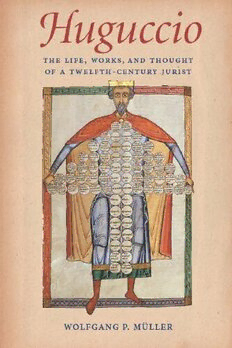
Allen Tate: The Modern Mind and the Discovery of Enduring Love PDF
Preview Allen Tate: The Modern Mind and the Discovery of Enduring Love
?-£uguccio STUDIES IN MEDIEVAL AND EARLY MODERN CANON LAW KENNETH PENNINGTON, GENERAL EDITOR EDITORIAL ADVISORY BOARD Robert L. Benson, University of California, Los Angeles Uta-Renate Blumenthal, The Catholic University of America Richard Helmholz, University of Chicago Stephan Kuttner, University of California, Berkeley John E. Lynch, The Catholic University of America Robert Somerville, Columbia University Brian Tierney, Cornell University STUDIES IN MEDIEVAL AND EARLY MODERN CANON LAW VOLUME 3 1£uguccio THE LIFE, WORKS, AND THOUGHT OF A TWELFTH-CENTURY JURIST WOLFGANG P. MULLER THE CATHOLIC UNIVERSITY OF AMERICA PRESS WASHINGTON, D.C. Copyright © 1994 The Catholic University of America Press All rights reserved Printed in the United States of America The paper used in this publication meets the minimum requirements of American National Standards for Information Sciences Permanence of Paper for Printed Library materials, ANSI Z39.48-1984. 00 LIBRARY OF CONGRESS CATALOGING-IN-PUBLICATION DATA MiilIer, Wolfgang P., 1960- Huguccio, the life, works, and thought of a twelfth-century jurist I by Wolfgang P. MiiIler. p. cm. - (Studies in medieval and early modern canon law ; v·3) Includes bibliographical references and index. I. Uguccione, da Pisa, Bishop of Ferrara, d. 12.10. 2.. Canonists- Italy-Biography. I. Title. II. Series. LAW 2.82.' .092.-dc2.0 [B] 93-1896 ISBN 0-8132.-0787-8 (alk. paper) ISBN 978-0-8132-2863-5 (pbk.) CONTENTS Acknowledgments vii Abbreviations IX Introduction 1 I. Huguccio: Canonist, Bishop, and Grammarian? 21 I. Canonist and Bishop? 23 2. Bishop and Grammarian? 35 3. Canonist and Grammarian? 48 4. Conclusion 64 II. The Summa Decretorum 67 I. Date of Composition 68 2. Stages of Composition 73 3. The Manuscript Tradition 75 4. Continuatio Prima 87 III. Huguccio's Use of Roman Law 109 I. The Decretist Background II 0 2. The Role of Secular Jurisprudence in Canon Law: Huguccio's Theoretical View 3. Roman Law in the Summa Decretorum Epilogue. The Rigor Huguccionis Appendix I. A Cumulative List of Extravagantes Cited in the Summa 153 Appendix II. Two Recensions of Continuatio Prima? 173 Appendix III. Dissensiones Dominorum in Huguccio's Summa 184 Bibliography 190 Indexes 207 v ACKNOWLEDGMENTS The core of the present book originally formed part of my PhD dis sertation, which was submitted to the Graduate School of Syracuse University in the spring of 1991. I have supplied the original format with a new Introduction and an Epilogue, and thoroughly revised Chapter II and the Appendices I and II. The rest of the text was re touched to a lesser extent. An earlier version of Chapter I appeared in Viator 2.2. (1991), 12.1-52., published by the Institute of Medieval and Renaissance Studies in Los Angeles, California. The Bibliography has been kept until the end of 1992.. I completed most of the work on Huguccio during my graduate and post-doctoral years at Syracuse University, between the fall of 1987 and the spring of 1992.. The project was not performed in a vacuum, so that lowe thanks to many people and institutions. I am particularly grateful for the financial support I received from the Graduate School of Syracuse University, which granted me a three year University Fellowship (1987-90), plus a Graduate Assistantship for 1990/91. I also obtained a Research Assistantship from Syracuse Law School (Fall 1991) and two stipends from the Roscoe Martin Fund, which allowed me to obtain important medieval manuscript material on microfilm. Since much of Huguccio is worked from manuscripts, the collaboration of various European and American libraries proved indispensable. Their names appear in the first section of the Bibliography. My special thanks go to the Bayerische Staats bibliothek in Munich, whose staff has always treated me with excep tional kindness. The same applies to the people working at Syracuse University's Interlibrary Loan. In the course of my research, I had many stimulating discussions with scholars and colleagues. Whenever possible, I included appro priate references to their contributions in the text and the notes. The task of these critics was made especially difficult due to the deficien cies of my English. Almost unaffected by any number of revisions, it would still retain a peculiar, non-native flavor. As a result, the sty- Vll viii ACKNOWLEDGMENTS listic outcome of Huguccio depends more on the idiomatic skills of others than I would like to admit. However, I must mention, with gratitude, Professor James Powell (Syracuse University), my colleague Brendan J. McManus, the readers for The Catholic University of America Press, and the patient copyeditor, Susan Needham. This final paragraph is dedicated to Kenneth Pennington. As my graduate advisor, he supported the work on Huguccio in many ways. I do not need to describe his role in great detail, as long as there may be a single word to capture its essence. I think the Germans are right when they call someone like him a good Doktorvater. WOLFGANG P. MULLER Munich, Germany ABBREVIATIONS Note: The abbreviations used for modern journals, series, and stan dard works follow the format and style of the Bulletin of medieval canon law, published by "The Institute of medieval canon law" in Berkeley, California. LEGAL CITATIONS a.c. Dictum of Gratian before chapter C. Causa (division of the second part of Gratian's Decretum) c. chapter Cod. Code of Justinian I Comp Compilatio prima 2 Comp etc. Compilatio secunda etc. D. Distinctio (division of the first and third parts of Gratian's Decretum) De cons. De consecratione (part III of Gratian's Decretum) De pen. De penitentia (C.33 q.3 of Gratian's Decretum) Dig. Digest of Justinian Inst. Institutes of Justinian Nov. Novellae of Justinian p.c. Dictum of Gratian after chapter q. quaestio (division of Causa of Gratian's Decretum) s.v. sub verbo, gloss to a phrase in a law, canon, etc. X Liber Extra or Decretals of Gregory IX IX
